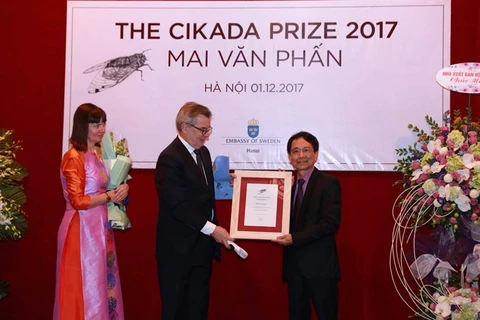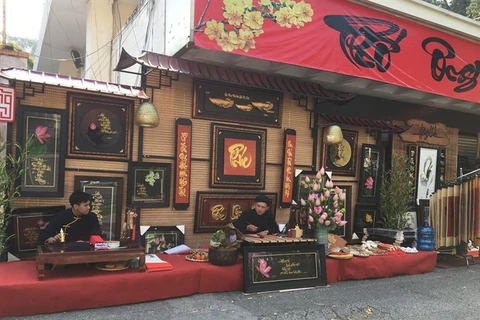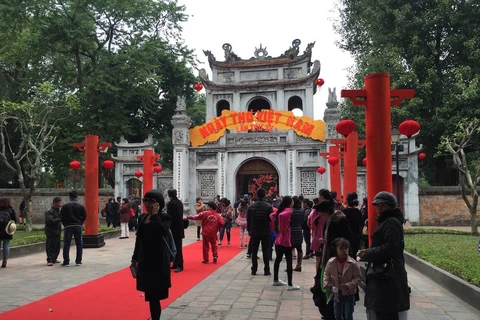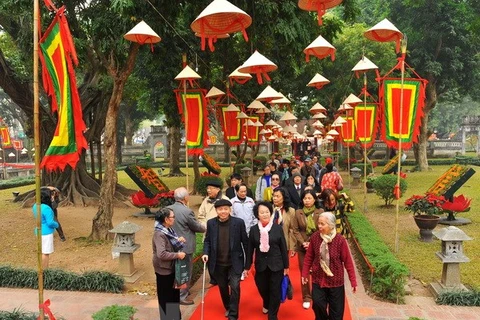 Teenagers release balloons printed with poems at last year’s Vietnamese Poetry Day at the Literature Temple in Hanoi (Source: VNA)
Teenagers release balloons printed with poems at last year’s Vietnamese Poetry Day at the Literature Temple in Hanoi (Source: VNA)Hanoi (VNS/VNA) - Many critics and poets attending a workshop on contemporary poetry in Hanoi on February 27 agreed: the country is home to many poets, but few good poems.
“Never before there have been so many poets and poetry fans,” said poet Vu Quan Phuong.
There are dozens of thousands of poetry writers throughout the country.
“There are about four thousand poetry collections published each year,” he said. “Poetry has become an elegant spiritual creative endeavour, which should be respected and encouraged. Composing poems has become a passion of the whole community, but few poetry reciting galas have been organised.”
Big-name publishers are no longer interested in printing poetry collections. That’s why poets themselves pay their own money to publish their work and struggle to sell their books.
“So our poetry is developing or descending? Some people said the more poetry is popular, the more trivial it is. We have seen no advanced features in contemporary poetry but no one wants to believe it is descending,” he said.
Poet Nguyen Viet Chien held that in the last year, poetry “lost the harvest” as there were no main prizes given to poets by the Vietnam Writers’ Association, the Hanoi Writers’ Association and HCM City Writers’ Association.
“There are too few good poems while too many bad ones,” he said. “That’s why poetry collections were printed but could not be sold, just for handing out as souvenirs.
“Many people said the golden time of Vietnamese poetry has passed and the poetry era has gradually disappeared, replaced by a technologically advanced era with the global integration of telecommunications technology and mass media,” Chien said.
“I have a sense that some young writers have focused on exploring strange things to express what others had not dared or avoid to mention,” commented poet Thanh Thao. “Even so, there remains a silent gap in poetry. Many writers tend to compose poems on the hard life of poor people in rural areas, while poems on urban rhythms seem to overwhelm the tranquility and peace of countryside.”
“While many poets like writing in new genres, the content of poems are not diversified,” he added. “No writers edge towards taboo topics in poetry. Love poetry seems to be more popular while there are fewer and fewer poems on burning issues.”
From a critic’s angle, poet Vu Quan Phuong said he has found almost no border between popular composing and advanced composing.
Poet Chien said the professional poetry genre should be more creative, renewed and high quality; otherwise the popular poetry genre may become the main stream in contemporary literature.
However, many other poets highly appreciated today’s Vietnamese poetry.
“Vietnamese poetry is moving,” said poet Vuong Trong. “Thousands of poetry collections published every year do not express the poets’ personal feelings; they discuss the country’s issues.
“A poem by teacher Tran Thi Lam from the central province of Ha Tinh published online titled Dat Nuoc Minh Ngo Lam Phai Khong Anh? (Our Country is Strange, Isn’t It?) has been read, shared by millions of people not because it contains super artistic feature but because it discusses what people think and are interested in,” he said.
Poet Mai Nam Thang said he expects poems to discuss big issues and human interests.
“Poetry should bear the national spirit and deep humanity to find the power to live and place to take root,” he said. “That requires the poet first of all should be a citizen with high responsibility. His or her country and community are among his or her biggest concerns,” Thang said.
Poet Huu Thỉnh, Chairman of the Vietnam Writers’ Association, said he highly values opinions at the workshop.
“We should not worry if there are too many poems composed because the movement itself will self-select,” he said. “New poems may not good but good poems are always new. Good poems should conquer people and stay inside people. Otherwise, the trend is just a modern fad and will soon be wiped away.”
Thỉnh said there are new things inside very old things.
“Literature in general and poetry in particular should become national culture,” he said. “That’s the noble destination that poets should aim to.”
The workshop is among the first activities for a series of events in the framework of the Vietnam Poetry Day between February 27 and March 2 throughout the country. Various activities will be organised at Hanoi’s Literature Temple on March 1.
On the same day, the HCM City Writers Association will hold a workshop to introduce five books on Mau Than Offensive in 1968 written by historic witnesses who directly and indirectly joined the fight.
An exchange meeting among members of 20 poetry clubs throughout the city will be held, where they will recite poems and camp together. A highlight of the programme will be the Young Poetry Playground gathering young writers like Minh Dan, Phan Thanh Binh, Tran Le Khanh and To Minh Yen.
Other exchange meetings will be organised on March 2. They are expected to gather thousands of poets and audiences with the main theme of praising veteran poets who joined the Mau Than Offensive in 1968 like Hoai Vu, Van Le and Trieu Tu Truyen.-VNA























